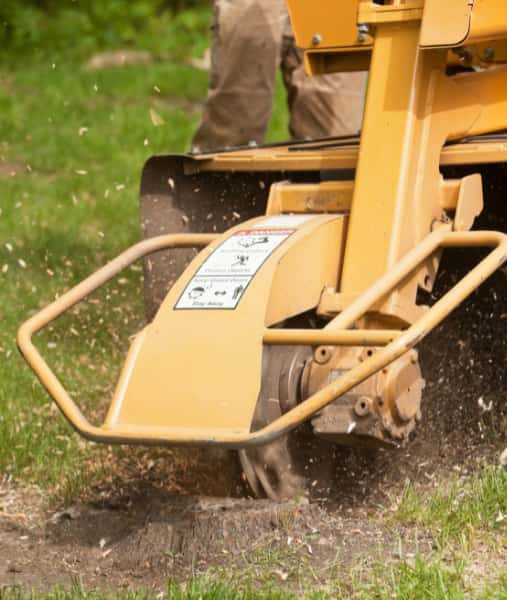The Hidden Danger Beneath Your Feet
When a tree is removed, it’s easy to think the job is done once the trunk is gone. However, what’s left behind — the tree stump — can quietly cause problems over time. Tree stumps are one of the most overlooked hazards in domestic gardens across the UK. They may appear harmless, but they can create safety risks, attract pests, and even lead to costly damage if ignored.
At Roydon Tree Surgeons, we’ve seen countless cases across Roydon and Essex where neglected stumps have become long-term garden problems. Understanding the risks they pose can help you take action before they escalate.
Trip Hazards Waiting to Happen
One of the most immediate dangers of an old tree stump is the physical risk it creates. Whether hidden by grass, leaves, or overgrown plants, stumps can be difficult to spot — particularly for children or visitors unfamiliar with your garden.
A trip or fall caused by a concealed stump can result in injury, and uneven ground left after a tree removal can make mowing and general maintenance more difficult. Over time, the exposed roots can also warp or shift the soil surface, creating additional hazards.
A Breeding Ground for Pests
Tree stumps provide the perfect environment for a wide range of pests. As the wood decays, it attracts insects such as ants, beetles, and termites, which can quickly spread to other parts of your garden.
Rotting stumps can also harbour fungi and other organisms that damage nearby plants or trees. In some cases, wood-boring insects may even migrate towards timber structures such as sheds, fences, or decking. Removing the stump early prevents these problems from developing.
Unwanted Regrowth and Root Spread
Even after a tree is cut down, its roots can remain active underground. Some species attempt to regrow from the stump or roots, sending up new shoots that can quickly become invasive. This regrowth not only spoils the appearance of your garden but also drains nutrients from the surrounding soil, limiting the health of your lawn and plants.
If left unchecked, roots can spread towards foundations, patios, or underground utilities, creating costly complications that could have been avoided with professional stump removal.
Fungal and Disease Risks
Old stumps that are left to rot become ideal hosts for fungal infections. The most common concern is honey fungus, which spreads through underground networks and can attack healthy trees and shrubs nearby.
Once this type of fungus takes hold, it can spread quickly through your garden, leading to widespread plant death and long-term soil contamination. Removing the source — the decaying stump — is the most effective way to prevent this problem.
A Barrier to Landscaping and Garden Design
From a practical standpoint, a leftover stump can make it impossible to fully utilise your outdoor space. Whether you want to plant new trees, lay turf, or create a patio, a stump in the way can limit your options.
Stump removal by Roydon Tree Surgeons allows you to reclaim valuable space in your garden. Once cleared, the area can be levelled and repurposed for planting, paving, or decorative features.
The Environmental Factor
Leaving a stump to decompose naturally might seem environmentally friendly, but in most cases, it does more harm than good. As the wood decays, it releases moisture that encourages fungal growth and soil imbalance. It can also affect drainage patterns, particularly in small gardens where soil health is crucial for plant stability.
Professional stump grinding offers a more sustainable alternative, breaking down the stump into fine wood chips that can be safely reused as mulch.
When Should You Remove a Tree Stump?
It’s best to act as soon as possible after a tree has been felled. The longer a stump remains, the more likely it is to decay, attract pests, or cause root-related issues. Signs that a stump should be removed immediately include:
- Visible fungal growth or mushrooms around the base.
- Fresh shoots emerging from the stump or surrounding soil.
- Signs of insect activity, such as holes or sawdust.
- Soil movement or cracks around the roots.
- Difficulty mowing or maintaining the area.
Why Professional Removal Is Essential
Removing a tree stump is not as simple as digging it out. Without specialist equipment and knowledge, it can be extremely difficult to remove the entire structure, especially if roots are deep or widespread.
At Roydon Tree Surgeons, we use professional-grade stump grinders designed to safely remove stumps below ground level without damaging surrounding areas. Our team ensures the process is clean, efficient, and tailored to the type and condition of your tree.
Conclusion
Tree stumps are far more than an aesthetic nuisance — they can be a genuine hazard to both safety and garden health. Ignoring them allows pests, fungi, and regrowth to take hold, while creating obstacles for future landscaping.
Roydon Tree Surgeons helps homeowners across Roydon and Essex safely and efficiently remove unwanted tree stumps. By tackling these hidden hazards early, you protect your garden, prevent long-term problems, and restore valuable outdoor space for years to come.
Call us on: 01279 744 797
Click here to find out more about Roydon Tree Surgeons
Click here to complete our contact form and see how we can help with your tree care needs.

